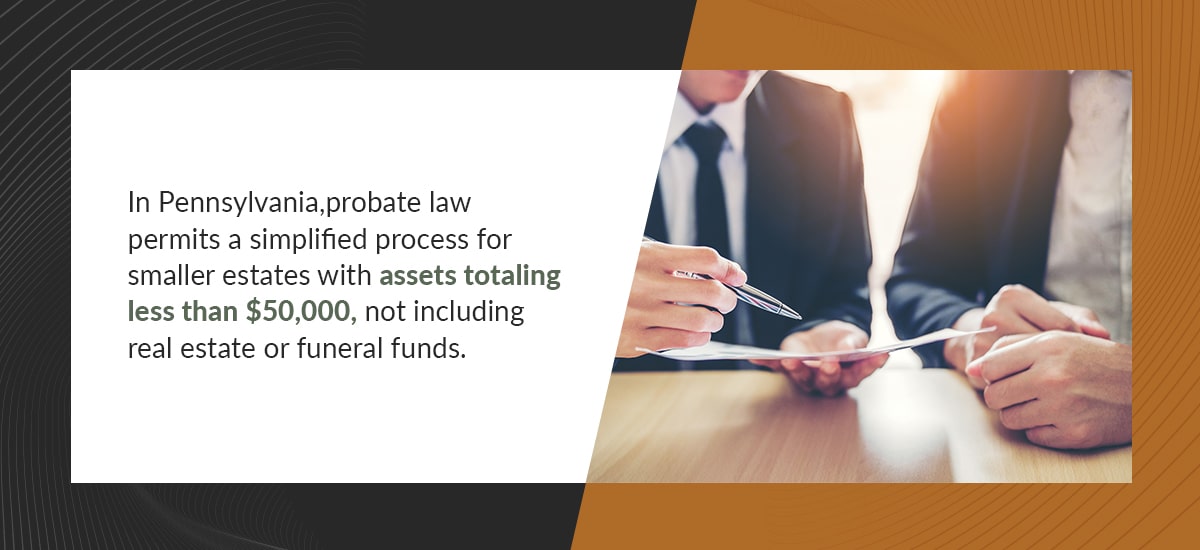If you are an heir waiting for your inheritance payout, you must wait until the probate court settles the estate before you can collect your share. Before a probate matter can begin, you will need to petition the court to open probate. With your inheritance in limbo, petitioning the court as soon as possible can help you receive your total inheritance more quickly.
The probate court process tends to be slow and complex, but it’s a required procedure for distributing inheritances. Fortunately, you don’t have to wait until court proceedings are completed before you can access a portion of your inheritance. At Inheritance Funding Company, we can help you get the cash from your inheritance when you need it.
What Is Probate?
Probate is the process in which all of a deceased person’s belongings and assets are distributed to their rightful heirs. A valid will identifies the rightful heirs. If a valid will is not available, intestate rules determine how the estate should be distributed. These rules prioritize every party who could potentially receive funds from an estate, such as family members, creditors and caretakers.
During the process, the probate court will appoint an administrator or executor to represent the estate. This person is responsible for overseeing the estate’s distribution to the proper beneficiaries. Typically, a probate lawyer assists with these tasks. The probate process can take months to years.
What Is the Probate Petition?
The probate petition is the court filing that initiates the probate court proceedings. Typically, a probate petition includes the original will, the death certificate and an application to be appointed as the executor. As a petitioner, you must request to be officially appointed as the executor by the probate court, regardless of whether the deceased’s will has named you as the executor.
The probate court may provide an executor application or an example you can follow. Information you may have to provide includes the names of other beneficiaries, names of surviving family members and the decedent’s date of death. Additionally, you may be able to request informal probate or independent administration of the estate.
You should also verify whether the original will has been filed with the court already. Though a probate court may accept mail or electronic petitions for probate, you may want to go in person so you can confirm with the clerk that you filed the petition correctly.

The Importance of Opening a Probate Process
Some states allow for simplified or informal probate.
In Pennsylvania, for example, probate law permits a simplified process for smaller estates with assets totaling less than $50,000, not including real estate or funeral funds.
In an informal probate process, the executor handles most tasks without the court’s direct approval. In many cases, estates must go through a complicated probate process before the rightful heirs can gain ownership of the assets.
What Does It Mean to File a Petition for Probate?
Until the probate court approves the estate’s executor, the estate’s assets cannot be distributed. If you are the appointed executor and you carry on with the estate’s distribution without notifying the probate court, you may face judicial penalties. Filing a probate petition and opening the probate is essential, as it informs the probate court of the decedent’s death and administration is about to start.
How Do You Probate a Will?
Follow the steps below about how to petition the court to open probate:
- Locate and file the will: If the decedent had a will, locate and read it. The will should reveal whether the decedent named an executor to handle the estate. If you find an executor has been named, hand over the will to that individual. The will must be filed with the court in the county in which the deceased lived. In some locations, you will submit the form to a separate probate court or to the court clerk who handles probate, civil and criminal matters.
- Determine an executor: If no executor is named in the will, someone will need to be appointed as the executor of the estate. If an executor is named in the wall, but the individual rejects the position, a new executor will need to be chosen. The court must approve the request. If you are the appointed executor and live in a different state, you must determine whether that state will allow you to act as executor.
- Make a list of the beneficiaries: The will should identify the beneficiaries. Make a list of each beneficiary’s name and contact information, such as phone numbers, addresses and email addresses. If there are any deceased beneficiaries, acquire their original death certificates.
- List the decedent’s assets and liabilities: Make a list of each asset the decedent owned, such as bank accounts, cash, investments, retirement accounts, real estate, jewelry, collectibles, vehicles, business interests and life insurance policies. You will also want to list each of the decedent’s debts, such as personal loans, mortgages, medical bills and credit cards.
- Get the petition notarized: The probate requires that the petition is notarized. Before signing the form, find a notary public and pay the fee for their services.
- Pay the fee: Find out what the fee is before you file the will and probate petition. This fee varies from county to county. Additionally, before you take the form and money to court, make a copy of each of the documents.
- Take the petition to the probate court: Give the clerk’s office the form and fee, then request that they stamp a copy for your records. The stamp shows the time and date you filed the probate petition to verify you met the state’s requirements.
What Happens After You File the Petition?
After you file the petition, you’ll wait to hear back from the probate court. The probate judge will review the file and either request additional information or admit the estate for probate.
A personal representative will also be authorized to act on behalf of the estate and beneficiaries. If you are the estate’s personal representative, you will then submit certified copies of the probate orders to every relevant financial institution.
For more information, check out our probate process timeline.
Contact Us to Learn More
Inheritance Funding Company can provide you with a cash advance on a portion of your inheritance while you go through the lengthy probate process to receive the rest of your inheritance money.
We offer free consultations, and you can receive a fast cash advance, regardless of your credit status or income. We take our payment directly from your remaining inheritance share, and if there isn’t enough money left in the estate to cover those costs, we take the loss and don’t require repayment.
When you choose to work with us, you can enjoy the following benefits:
- No credit check
- Same-day funding
- No interest charged
- Low price guarantee
- No collateral required
- No employment check
- No risk of non-payment
- No effect on credit scores
Since 1992, we have advanced more than $200 million, and we are rated A+ by the Better Business Bureau. Contact us at Inheritance Funding Company today or apply now to get your inheritance cash advance.






